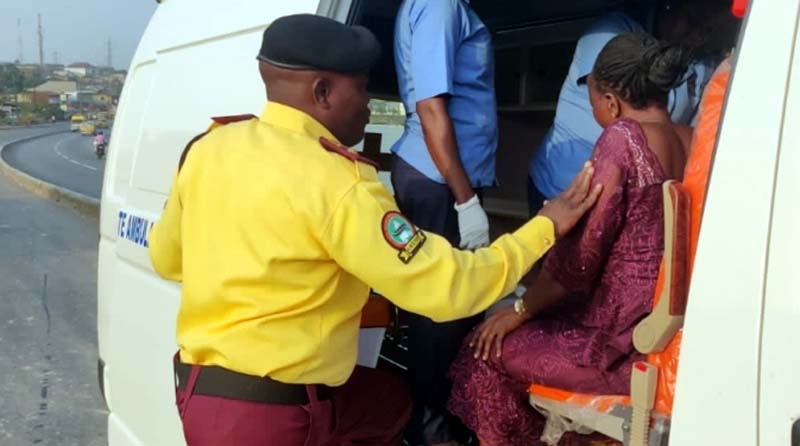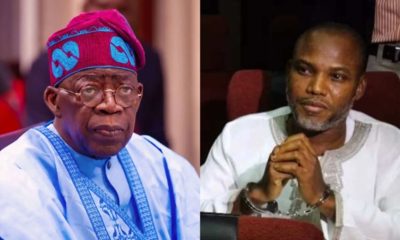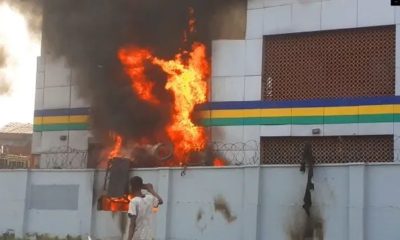“This unfortunate incident underscores LASTMA’s resolute commitment to preserving lives and ensuring safety on Lagos roads through proactive interventions and collaborative engagements with emergency response agencies,” he said.

My lords, I participated in the conference leading to the leading ruling of the Court just delivered Hamman Akawa Barka, JCA, and I am completely satisfied with the reasoning, conclusions and others made therein, which I hereby adopt as mine.
However, due to the monumental issues thrown up by an otherwise seemingly innocuous application for leave to appeal against the order of interlocutory injunction of the lower Court made against the applicant, I intend to add my considered words and voice to the rich analysis in the leading ruling already delivered.
My lords, the facts and circumstances leading to this application by the Applicant for leave to appeal are as germane as they have been all over the public domain for the past eight months during which period the entire Public University System in Nigeria has been brought to a standstill with the gates of our universities being under lock and keys and the students at home for the past eight month.
At the lower Court, the National Industrial Court Abuja Division, the Respondent had approached the lower Court by way of a referral done pursuant to the powers of the Hon Minister of Labour and Employment as the impasse between the parties had become protracted without any near end in sight. The Respondent has sought an order of interlocutory injunction of the lower Court restraining the Applicant from continuing with their strike action.
It would appear that issues were duly joined by the parties and after hearing the parties, the lower Court had granted the order of interlocutory injunction sought by the Respondent and thereby directing the Applicant to resume work pending the hearing and determination of the substantive suit. It was the said order with which the Applicant was peeved that an application has now been made to this Court seeking leave to appeal as well as for an order of stay of execution of the interlocutory order of inunction pending the hearing and determination of their appeal against the said order of the lower Court.
READ ALSO:
The parties have duly filed and exchanged their processes and written addressee, which at the hearing of this application on 6/10/2022 were duly adopted and adumbrated upon by learned Senior Advocates for the parties, namely, Femi Falana SAN for the Applicant on the one hand, and I. J. Igwe SAN for the Respondent on the other hand. I have taken time to calmly read through the facts and circumstances as deposed to in the Affidavit and Counter-Affidavit of the parties. I have also taken time to scrutinize the several documents relied upon by them. I have also considered the enlightening and weighty submissions of learned Senior Advocates for the parties, carefully noting the several decided cases relied upon by them.
Now, at the hearing of this application, the Applicant had even before commencing arguments on the application applied to withdraw the second prayer on the Motion papers for stay of execution of the order of interlocutory injunction granted against it by the lower Court, and thereby leaving only the relief of leave to appeal. However, this application to withdraw the second relief was stoutly opposed but having considered the application to withdraw relief two and the objection thereto, I see no legal impediment why the Applicant cannot withdraw its own prayer before a decision one way or the other has been taken on it by this Court when even a substantive appeal can be withdrawn even after the parties had filed and exchanged their briefs, and same would be dismissed by the Court. See Order 11 Rule 5 of the Court of Appeal Rules 2021.
Consequently, I hold that the application to withdraw prayer two on the motion papers is in order and ought to be granted. Accordingly, prayer two for stay of execution of the interlocutory order of injunction of the lower Court made against the Applicant is hereby struck out having been withdrawn by the Applicant.
In law, the appellate system in this Country has taken firm root in our legal system principally due to the sacrosanct nature of the right of appeal, either as of right or with leave, of the citizen to approach a higher level of Court in the hierarchy of Courts in Nigeria to ventilate his grievance against decisions of a lower Court with which he is dissatisfied or peeved. However, it is of great importance to note that the right of appeal, though sacrosanct, does not exist in vacuo. It must exist either constitutionally or statutorily. In other words, the right to appeal can neither be inferred nor implied, and there is also no inherent right of appeal. Thus, for a right of appeal to exist and be available to a party it must be shown to exist either constitutionally and/or statutorily. Therefore, where no provision of a right to appeal exists, then no appeal will lie. See Iwok V. Inyang & Ors (2022) LPELR – 58413(CA) per Sir Biobele Abraham Georgewill JCA. See also Diwe V. Nwanosike (2017) LPELR – 41687 (CA). See also Iwuagwu V. Okoroafor & Ors (2012) LPELR-20829 (CA); Emecheta V. Sowemimo (2018) LPELR -50419 (CA); per Sir Biobele Abraham Georgewill JCA; Elephant Group Plc V. National Security Adviser & Anor (2018) LPELR – 45528 (CA) per Sir Biobele Abraham Georgewill JCA; Akinbisehin V. Olajide (2018) LPELR – 51172 (CA) per Sir Biobele Abraham Georgewill JCA.
READ ALSO:
It follows therefore, that in law the right of appeal is a constitutional one and thus sacrosanct, inviolable and must not be lightly fettered with or encumbered in its exercise by the citizen who feels aggrieved with the decision of a Court. However, by the combined effect of Sections 241, 242 and 243 of the Constitution of Nigeria 1999 (as amended), it is a right exercisable only by a person aggrieved within the purview or confines of the constitutional or statutory provision creating the right of appeal. Thus, the right of appeal from the decisions of the lower Court to the Court of Appeal is exercisable only upon the fulfillment of some well-defined constitutional preconditions, namely:
A. The right of appeal can only be exercised by a party to the proceedings or any other person having an interest in the subject matter;
B. For a party or person to exercise the right of appeal, he must show that he is aggrieved by the judgment or decision;
C. A person aggrieved by a decision is one against whom a decision has been pronounced which has wrongfully deprived him of something, who is adversely affected by the decision of the Court in that the decision wrongfully refused him something, or wrongfully affected his title to something.
See Elephant Group Plc V. National Security Adviser & Anor (2018) LPELR-45528(CA) per Sir Biobele Abraham Georgewill JCA. See also Ogunkunle & Ors V. Eternal Sacred Order of the Cherubim and Seraphim & Ors (2001) 12 NWLR (Pt. 727) 359 . See also Adeleke & Anor v. Oyo State House of Assembly (2006) 10 NWLR (Pt. 987) 50; Okoye V. Tobechukwu (2016) LPELR – 41508 (CA); Tochukwu Anyanwu V. Emezie Okoroafor & Ors. (2012) LPELR-20823 (CA).
An application of this nature seeking the indulgence of this Court to grant leave to appeal is one which involves an exercise of discretion and thus in law it is only where the Applicant has furnished the relevant materials showing Ground (s) which pima facie show good cause why the Appeal should be heard that it can be favourably considered and not otherwise. See Dana Airlines Limited V. Mr. Yahuza Yage Bamaiyi & Anor (2017) LPELR-43054(CA) per Sir Biobele Abraham Georgewill JCA. See also Ngere V. Okuruket XIV & Ors. (2014) 11 NWLR (pt. 1417) 147 @ pp. 155 – 156.; ANPP V. Albishir (2010) 9 NWLR (Pt. 1198) 118 @ p. 143; Ikenta Best (Nig) Ltd. V. AG. Rivers State (2008) 2 – 3 SC (pt. 1) 128; Braithwaite & ors. v. Dalhatu (2016) LPELR – 40301 (SC).
However, at this stage of only considering whether or not to grant leave to appeal there is no duty on the Applicant to show that the proposed grounds of appeal will succeed but all that is required of such an applicant is to show that from the proposed grounds of appeal the appeal is arguable. In Obikoya V. Wema Bank Ltd. (1989) 1 NWLR (pt. 196) 157 @ p. 178, the Supreme Court per Obaseki JSC, had considered this issue and opined succinctly inter alia thus:
“A ground of appeal showing good cause why an appeal should be heard is a ground which raises substantial issues of facts and law in the consideration of the Court. It is a ground which makes a serious debate as to the correctness of the decision of the Court below. It is a ground which tasks the intellect and reasoning faculties of the appeal judges. It is a ground which is not frivolous.”
See also Re Adewunmi (1988) 3 NWLR (Pt. 83) 483; Dana Airlines Limited V. Mr. Yahuza Yage Bamaiyi & Anor (2017) LPELR-43054(CA) per Sir Biobele Abraham Georgewill JCA.
READ ALSO:
This application calls for the exercise of our discretion based on the facts as placed before us by the parties and the applicable laws, rules and principles. I am aware that in law an exercise of discretion such as is required in the consideration of the present application, though not subject to so much hard and fast rules, must be founded on justice, fairness and law but certainly never on the whims and caprice of the Court with scant or no regards to the facts of the case. See Dana Airlines Limited V. Mr. Yahuza Yage Bamaiyi & Anor (2017) LPELR-43054(CA) per Sir Biobele Abraham Georegwill JCA. See also The Vessel MT. Sylla & Anor V. Ghana Commercial Bank Ltd & Ors (2021) LPELR – 54556 (CA) per Sir Biobele Abraham Georgewill JCA; University of Lagos V. Aigoro (1985) 1 NWLR (Pt. 1) 143; Aboseldehyde Lab. Plc. V. U. M. B. Ltd (2013) 13 NWLR (pt. 1370) 91 @ pp. 97 – 98; Aro V. PDP (2013) 13 NWLR (pt. 1371) 235: Thimnu V. UBN Plc. & Ors. (2013) LPELR 22127 (CA) @ pp. 20 – 21; “
In this application I have borne in mind, and as aptly submitted by the Applicant’s counsel, that the right of appeal is one of the most sacred and inalienable rights of the citizens to challenge decisions affecting or touching their rights and obligations under the laws of the land and with which they feel aggrieved and thus the right of appeal should most sparingly be allowed to be impeded with and nothing must be done lightly to stultify it. In E. F. P. C Ltd. V. NDIC (2007) All FWLR (pt. 367) 798 @ pp. 825 – 826, the Supreme Court had restated this succinct principle of law in very clear and precise words inter alia thus:
“The right of appeal is constitutional as it is provided in the Constitution. It stands on the very height of the Appeals system by virtue of the fact that the Constitution provides for it.”
It is perhaps for the above reason that the Courts have over the years been very liberal in its attitude when considering applications for leave to appeal against the judgment or ruling of one level of Court to the next level of Court in the hierarchy of Courts in the land. Thus, once an applicant discloses grounds of appeal which prima facie show good cause why the appeal should be heard, a Court is obliged to grant the leave sought to enable the Applicant ventilate his grievances against the decision of the Court he is dissatisfied with as guaranteed him by the Constitution under the right of appeal. See Sections 241, 242 and 243 of the Constitution of Nigeria 1999 (as amended).
Now, in law where an appeal is with leave, an intending Appellant does not have as of right has the right to file a Notice of Appeal without first seeking and obtaining the leave of Court. This is what the Applicant has sought to do in this application and it will be highly remiss to deny the application of the exercise of this right even if at least on conditions to be fulfilled before the right is invoked or exercised against the Ruling and Orders of the lower Court. I am aware that the law is that the Applicant need not show that by the grounds, the appeal is likely to succeed but still it carries the onus to show that prima facie the grounds of appeal disclose good arguable issue. See Dana Airlines Limited V. Mr. Yahuza Yage Bamaiyi & Anor (2017) LPELR-43054(CA) per Sir Biobele Abraham Georgewill JCA. See also Iwuagu V. Okoroafor & ors (2012) LPELR – 20829 (CA). See also FCMB Plc. V. NIMR (2009) 9 NWLR (Pt. 1147) 509; NNPC V. O.E. Nig. Ltd (2008) 8 NWLR (Pt. 1090) 583; Savanah Bank Nig. Plc V. CBN (2007) 8 NWLR (Pt. 1035) 26 @ p. 39; E.F.P Co Ltd V. NDIC (2007) 9 NWLR (Pt. 1039) 216.
In law, who then is “a person aggrieved” or “a person interested” within the context of the right of appeal as constitutionally guaranteed to the citizen? In Ikonne V. COP & Anor (1986) 4 NWLR (Pt. 36) 473 @ p. 479, the Supreme Court had expatiated on the meaning of ‘a having interest’ inter alia thus:
“The expression ‘person having interest’ has been defined as synonymous with person aggrieved. A person aggrieved must be a man against whom a decision has been pronounced which has wrongfully deprived him of something or wrongfully refused him something or wrongfully affected his title to something….A person aggrieved includes a person who has a genuine grievance because an order has been made which prejudicially affects his interest.”
See also Ziklagsis Networks Ltd. V. Adebiyi & Ors (2017) LPELR-42899 (CA) per Sir Biobele Abraham Georgewill JCA; Re: Sidebotham, Ex – Parte Sidebotham (1990) 14 CH. D. 465; In Re: Reed Bowen & Co. Ex- parte Official Receiver (1987) 19 Q. B. D. 178
So, in the light of the above well settled position of the law, is the Applicant a person aggrieved with the decision of the lower Court granting an order of interlocutory injunction against it pending the determination of the Respondents’ Suit filed against it before the lower Court within the purview of the provisions of Sections 241, 242 and, 243 of the Constitution of Nigeria 1999 (as amended) to be clothed with the right standing to appeal it and are there reasonable grounds disclosed for the leave sought to appeal and are there any likelihood or chances of success of these grounds? In other word are the ground relied upon by the Applicant such as disclose prima facie reasonable grounds why the appeal should be heard? I most certainly think so! I therefore, answer all these critical and crucial posers in the affirmative in favour of the Applicant.
My lords, in resolving to granting this leave to appeal to the Applicant, though a conditional one as I will show anon, I bear in mind that in law amidst the resultant clash of arms, as between the Federal Government on the one side and the Academic Staff Union of Universities on the other side, and regrettably the majority of students in the universities in this country are left on their own and in the lurch and without neither any say nor hope and any end in sight to their untold sufferings being out of school for 8 months now and still counting, it is said, and quite aptly too, that the Court will not and will never be silent. See Attorney General V. De Keyser’s Royal Hotel (1920) AC 508 per the House of Lords. See also Margaret Stitch V. AG. Federation & Ors (1996) 5 NWLR (Pt. 46) 1007 @ p. 1026 per Aniagolu JSC; Elephant Group Plc V. National Security Adviser & Anor (2018) LPELR-45528(CA) per Sir Biobele Abraham Georgewill JCA.
However, in acceding to the request of the Applicant in the exercise of its constitutional right of appeal, this is one case going by the admitted continued disobedience of the order of the lower Court now being sought to be appealed against and which disobedience had become more glaring and indefensible upon the withdrawal of the prayer for stay of execution of the orders of the lower Court, which relief having been withdrawn is hereby struck out by me. In the circumstances therefore, I am minded to and would therefore grant to the Applicant condition leave to appeal subject to the Applicant immediate compliance and obedience of the subsisting and valid order of interlocutory injunction granted against it by the lower Court as a condition precedent to the exercise of its’ right of appeal.
On the whole therefore, the application for leave to appeal against the interlocutory order of injunction against the lower Court by the Applicant has merit and it is hereby granted conditionally in order not to foist on the Applicant the toga of any finality in the decisions and orders of the lower Court, a Court of first instance, without any opportunity to challenge and ventilate its grievance against such decisions and orders in a country with well – established appellate system of administration of justice, even very widely acknowledged and accepted in the judicial systems of all of the West African Sub-Region.
In the result, I also grant the application and for the avoidance of doubts, I hereby Order as follows:
1. The Applicant shall immediately comply with and obey the Order of interlocutory of injunction of the lower Court made against it, the subject matter of the leave being sought to appeal in this application.
2. Upon the immediate compliance and return to work and their duty post as in Order one above, leave is hereby granted to the Applicant to appeal against the decision and Order of interlocutory injunction made against it by the lower Court.
3. The Application shall, upon the immediate compliance with Order one above and complying with the Order of interlocutory injunction made against it by the lower Court and immediately upon returning to work today, 7/10/2022, have 7 days from today, 7/10/2022 within which to file its Notice and Ground of Appeal at the Registry of the Lower Court.
4. However, should the Applicant fail to immediately comply with Order 1 above in this Ruling today, 7/10/2022, the leave to appeal granted to the Applicant is hereby automatically vacated without the need for any further Order or assurances of this Court or any other Court of law.
5. There shall be no order as to Costs
. Sir Biobele Abraham Georgewill, Justice, Court of Appeal
COUNSEL: Femi Falana SAN with Femi Adedeji Esq and Abubakar Marshall Esq. for Appellant.
J.U.K. Igwe SAN with Senator (Dr.) Ita Enang, Chukwulo Moedu Esq, Senator Osita Izunaso, Matthias Agboni Esq, C.M. Edozie Esq, Valentine Nonso Esq for the Respondents.
Eagle

Alleged money laundering: Court temporarily freezes 21 bank accounts, orders holders’ arrest
A Federal High Court in Abuja on Friday ordered the temporary freezing of 21 bank accounts domiciled in some commercial banks and directed the arrest of the account holders by the police.
Justice Emeka Nwite gave the order after counsel for the Inspector-General (I-G) of Police, Ibrahim Mohammed, moved a motion ex-parte to the effect.
Justice Nwite also granted the “order directing the banks to issue details of the account package(s) and to place a Post-No-Debit (PND) on the accounts, disable the ATMs while allowing inflow into the said accounts” pending the conclusion of the investigation.
“I have listened to the submission of the learner counsel for the applicant and gone through the affidavit evidence.
“I am of the view that the motion ex-parte is meritorious.
“The application is hereby granted except that the period of the investigation can only last for a period of 90 days,” Justice Nwite said.
The judge adjourned the matter until April 3 for mention.
The banks are Access Bank Plc, Sterling Bank Ltd, Wema Bank Plc, Fidelity Bank Plc, Zenith Bank Plc, Union Bank Plc, Guarantee Trust Bank Ltd, United Bank of Africa Plc, Stanbic IBTC Bank Plc, First Monument Bank Plc, Heritage Bank Plc, TAJ Bank Plc and Keystone Bank Plc.
READ ALSO:
The News Agency of Nigeria (NAN) reports that while the I-G is the applicant in the motion ex-parte marked: FHC/ABJ/CS/1965/V/2024, the 13 banks are sued as 1st to 13 defendants respectively.
The I-G, in the motion filed by Mohammed, sought an interim order directing the listed “banks to freeze the accounts mentioned in the schedule attached to this summon pending investigation and prosecution of this case.
“An order directing the banks to issue details of the account package(s) and to place a Post-No-Debit (PND) on the accounts, disable the ATM while allowing inflow into the said account as from the date of this court order.

Youths beat Osun monarch for appointing Imam on disputed community
The crisis erupted in the Hallelujah community in Egbedore local government area of Osun State on Friday, as enraged residents beat the newly installed Ajeniju of Hallelujah, Oba Jelili Olaiya while attempting to conduct jumat service in the area.
The Ajeniju, who was installed by the Timi of Ede a few months ago, against the will of the Ido-Osun community, was beaten to a pulp by angry youths, saying he had no right to install a chief Imam in the community.
It was gathered that the monarch had last week turbaned one Ahmad Tijjani as Chief Imam of the Hallelujah community, but while gathering some people at his palace to observe jumat prayer, some youth allegedly from Ido-Osun invaded the palace and disrupted the exercise.
Some of the aggrieved youths while shouting at the monarch queried his authority to install and conduct jumat prayer in a domain belonging to a separate monarch.
READ ALSO:
The mob beat the monarch seriously and vandalised the palace before security operatives could intervene in the situation.
A security source who pleaded anonymity disclosed that it took the intervention of security operatives to rescue the monarch from the scene.
“The situation escalated, resulting in the vandalization of the palace and a physical attack on Ajenifuja of Hallelujah, who sustained serious injuries. He has since been taken to the State CID for further investigation and safety”, said the source.
However, another source in the community disclosed that the monarch has been taken to the Osun State University Teaching Hospital, Osogbo for treatment.
Confirming the incident, the Special Adviser to Governor Ademola Adeleke on Security, Hon. Samuel Ojo said he will not comment on the incident pending the outcome of an investigation on the matter.

Lagos commuter bus summersaults, LASTMA rescues 8 injured passengers
The Lagos State Traffic Management Authority (LASTMA) has rescued eight injured passengers involved in an accident at Hammadiya inward Abule-Egba.
The LASTMA General Manager, Mr Olalekan Bakare-Oki, confirmed this in a statement made available to the News Agency of Nigeria (NAN) on Friday in Lagos.
The statement was signed by Mr Taofiq Adebayo, Director, Public Affairs and Enlightenment Department, LASTMA.
Bakare-Oki said the road traffic incident which involved a commercial long bus, popularly referred to as ‘Molue,’ at Hammadiya inward Abule-Egba, caused severe injuries and significant disruption to traffic.
“The accident was triggered when the vehicle, registered as KTU 801 XM, lost control at excessive speed, reportedly due to driver impatience.
“In an attempt to avoid colliding with another LT commercial bus and pedestrians awaiting transport at the roadside, the driver veered sharply, resulting in the bus crashing into the expressway median and overturning.
“Several passengers sustained injuries, while others escaped through the bus’s windows,” he said.
READ ALSO:
He said that officers from LASTMA promptly arrived at the scene, executed a well-coordinated and efficient rescue operation.
“Eight individuals, including five males and three females, suffered varying degrees of injuries. Among the injured was the bus driver, who sustained a fractured left arm.
“All victims were immediately handed over to LASAMBUS medical personnel and transported to the General Hospital at Ile-Epo for urgent medical attention,” he said.
Bakare-Oki said to ensure the free flow of traffic and public safety, LASTMA’s Response Unit was swiftly mobilised to oversee the removal of the overturned vehicle.


‘Deepen Shariah knowledge to curb misinformation’


Ilorin: Retired works controller murdered on New Year’s Day


Jealous husband stabs Bishop to death over allege affair with wife


Tinubu’s refusal to honour Seyi’s pact with us disappointing – Nnamdi Kanu’s family


How Tinubu outsmarted Buhari to become president – Ojudu


Mosques should be research centres – Varsity don


Horror in Ogun as twin brothers kill, dismember sex worker


Fire razes police station, buildings in Lagos